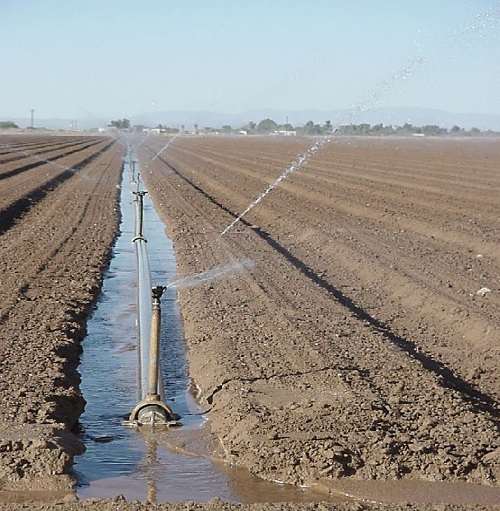Arizona Agriculture and Water Cannot Live Without Each Other
Published
8/1/2013
In a recent editorial, Arizona Farm Bureau’s Joe Sigg said, “Agriculture has a much more storied relationship with water than many other sectors of the public. It's a key input of production, and for all of

He and others in the state are moving the dialogue forward on our state’s water issues, especially as it relates to Arizona agriculture.
Sigg further states, “It is the ‘somewhere’ that puts a different spin on water for Arizona agriculture. Of course, it has to fall somewhere in the Midwest, for example, but the ‘somewhere’ is
“Much of Arizona water involves availability and costs of putting it on crops and livestock. Water is not just necessary - it's
Sigg and the agriculture community are centered on our state’s water availability and how much water costs in order for agriculture to operate. In fact, he points to three main issues every farmer and rancher regularly
Water’s availability and cost
- I have it - but somebody else wants it.
- I am short on water - what are my opportunities and what are the costs?
- My costs are pushing water out of reach - what are my options?
So, Arizona Farm Bureau is stepping up its efforts to make sure Arizona agriculture’s water issues are protected and where they should be in our current environment. One way Farm Bureau is handling this is conducting a thorough review of our current water policies that exist in our Arizona Farm Bureau Policy Book.
Government Relations Manager Ana Kennedy recently completed an effort that compiled all our water policy into one document for easy review and discussion. The intent is to allow our county Farm Bureau leaders a way to compare current water policy and see what’s missing, needs to be updated and/or added.
Arizona Farm Bureau President Kevin Rogers considers our water and labor issues the top priorities for farmers and ranchers to address. “We have two issues that this organization hinges on for the future,” Rogers explains. “Labor - we’ve worked really hard on visa reform - and water. Without water, nothing grows; none of it works. To
Referring to the historical legacy of agriculture’s role in our water development and infrastructure, Rogers adds, “Its key to the future of the state and Arizona is what it is today because of our past and the things our state’s farmers have done to keep the water here and available and on our land.”
Most Arizona historians note that if our earlier generation of farmers and ranchers had not put in the infrastructure for our current system including putting up their land as collateral to build Roosevelt Dam, for example, in order to bring a more managed water system to this desert state.
Wrote Sigg in his editorial, “In one of his letters, George Washington said the problem with republics is they don't respond when they see a
“Be assured the Arizona agricultural community has an intimate feel for
“We have areas where crop plantings are down by a third this year because they don't have reliable availability. We are facing shortages on the Colorado River which ultimately will impact all users of this water source.”
We encourage our county Farm Bureau agriculture leaders to become familiar with our Farm Bureau water policy and determine what’s most important in our current environment. Arizona Farm Bureau’s water-related policy is compiled in one 8-page document for ease of use.
Ultimately, Arizona agriculture’s future will be decided by how effectively we manage and conserve our water. Without it, Arizona agriculture cannot thrive.